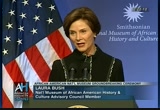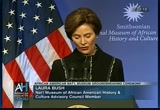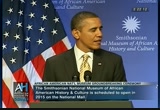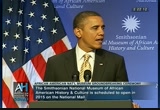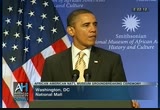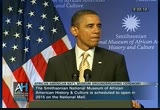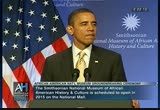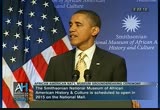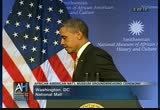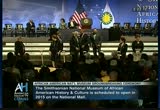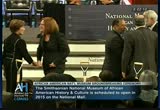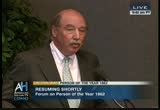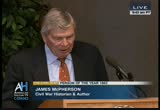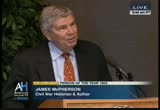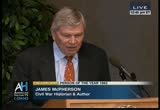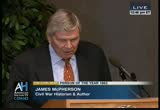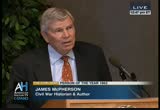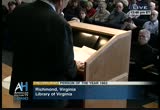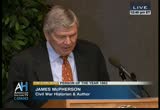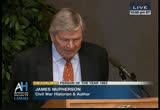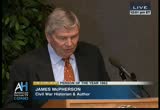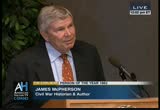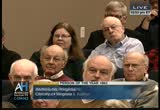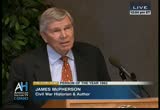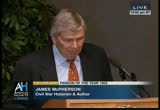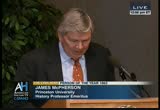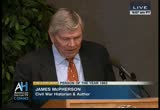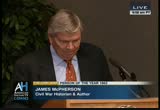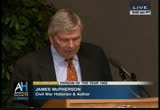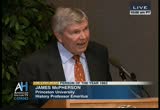tv [untitled] February 25, 2012 12:30pm-1:00pm EST
12:30 pm
culture began by a bipartisan measure through legislation by john lewis and j.c. watts, and senators max cleelen. and my husband was proud to sign it in law in 2003 to envision the museum built on the mall where we honor artists, inventors, explorers, soldiers. i'm proud of the museum's vision which is dedicated not simply to this building, but also reaching out to communities around the nation. the museum has always begun traveling expeditions. and artifact preservation programs. it's a museum that is dedicated to welcoming all americans, whether or not they'll be able to travel to washington, d.c. i'm glad, too, that this building will stand next to the monument to our first president, george washington.
12:31 pm
a man who fought for liberty and who came to recognize the evil of bondage, freeing his slaves in his will. side by side, these two spots are symbolic of our own national journey. for the stories that will be preserved within these walls. the stories of suffering and perseverance, of daring and imagination and triumph, are the stories of african-americans. but they're also stories that are forever woven through the hearts of the fabric of our nation. thank you all, and god bless you all. [ applause ] >> it is now my great honor and
12:32 pm
privilege to welcome the president of the united states. [ applause ] >> thank you. thank you so much. thank you so much. thank you very much. well, good morning, everybody. i want to thank for that introduction and her leadership at the smithsonian. i want to thank everybody who helped to make this day happen. i want to thank laura bush, secretarysalazar. sam brownback. mycongressman johnlewis.
12:33 pm
elaine clump, and everybody who worked so hard to make this happen. i'm so proud of lonnie bunch who came here from chicago, i want to point ht.ing a conversation with him about this job, when he was planning to embark on this extraordinary journey. and we could not be prouder of the work that he has done to help make this day possible.f. as others have mentioned, this day has been a long time coming. the idea for a museum dedicated to african-americans was first put forward by black veterans of the civil war. years later, the cause was picked up by members of the civil rights generation. by men and women who knew how to fight for what is right and strive for what is just.
12:34 pm
an honor to be here to be the proof of your labors. it's also fitting that this museum has found a home on the national mall. it has been mentioned, it was on this ground long ago where hundreds of thousands have marched for freedom. it was here that the pillars of our democracy were built. and it is on this spot alongside the monument to those who gave birth to this nation and those who worked so hard to perfect it. the generations will remember the sometimes difficult, often inspiration also but also sensible roles that african-americans played in the life of our country. this museum will celebrate that history. because just as the memories of our earliest days have been
12:35 pm
confined in dusky letters and faded pictures, the time will come when few people will remember boarding a segregated bus. or hearing in person dr. king's voice boom down from the lincoln memorial. that's why when we build here, it won't be just an achievement for our time. it will be a monument for all time. it will do more than just simply keep those memories alive. it's like the space museum challenges success, and the national museum encourages us to look closer or the holocaust museum calls us to fight execution, wherever we will find it. this museum will stand as proof that the most important things in life rarely come quickly or
12:36 pm
easily. it should remind us that although we have yet to reach the mountain top, we cannot stop climbing. that's why in moments like this, i think about malia and sasha. i think about my daughters, and i think about your children. millions of infants who will stand where we stand long after we're gone. i think about what i want them to experience. i think about what i want them to take away. when our children look at the plane flown by tuskegee airmen. i don't want them to be seen as figures larger lan life. i want ow ordinary americans can do extraordinary things. how men and women just like them had the courage, determination
12:37 pm
to right a wrong and make it right. daughters to see the shackles that bound slaves on their voyage across the ocean and the shards of glass moved from the 16th street baptist church. and understand that injustices and evil exists in the world. but i alsohem to hear louis armstrong's horn and learn about the negro league and read the poems of i want them to appreciate this museum, not just as a record of tragedy, but as a celebration of in future generations here, the songs of pain and progress and struggle and sacrifice, i hope they will not think of them as somewhat different from the hem to see it and sense an important part of our shared
12:38 pm
story. to be ourselves in one another. a cause to remember that each of us isad image. that's the history we will preserve within these walls. the history of a people who in the words of dr. king injected new meaning and dignity into the veins of civilization. may we remember their stories. may we live up to their examples. thank you, god bless you. and god bless the united states of america. [ applause ]
12:39 pm
12:41 pm
you please join me in honoring the wonderful work done today by fa leisha es felicia rashad. [ applause ] and here on "american history tv" on c-span3, we're going to take you live to the library of virginia. on your screen is waite rawls who is the president and ceo of the museum of the confederacy. you're also seeing james mcpherson, who is the next historian going to speak and make his speech on the person of the year 1862. live here. >> thank you very much. i hadn't known that story about the press corps. very much worth reading. i don't know wherever the press
12:42 pm
corps will be reading that here or not. in september 1864 -- john, don't worry, i'm going to focus on '62. but i'll start with a quotation from september own 64. captain charles steedman. united states navy offered what should would consider extravagant praise for the public of my talk today. that man says steedman, actually under medium height, clean-shaven with piercing eyes and determined jaw, that little man has done more to put down the rebellion than any general except grant or sherman. some of you may have already figured out who steedman was talking about. it was, of course, admiral david glasgow faragan the commander of the fleet in mobile bay.
12:43 pm
but even more important, more logical to the focus today, the captain of new orleans and the control of the union in the lower mississippi valley in 1862. in my judgment, these achievements along with the ft. hudson campaigns in 1863, but especially, the capture of new orleans, one of the most important northern strategic victories of the war, do indeed entitle farragut with close status with grant and sherman in winning the war. in the eyes of contemporaries in 1861, however, farragut's allegiance to the united states in the sectional conflict was an open question. although he had served under the american flag for half a century and then fought in the war of 1812 and the mexican war under that flag, a similar record was
12:44 pm
true of other southern-born officers who chose to go with the confederacy. farragut has been born and raised in tennessee. had married a woman from virginia. after his first wife died, he married another virginia woman in 1843. when he was not at sea, he lived in norfolk. he had a brother in new orleans. and a sister in mississippi. as the sectional conflict heated up, he said to friends in virginia, god forbid i should ever have to raise my hand against the south. but when abraham lincoln called off the militia after the confederates attacked ft. sumpter, farragut expressed approval of that action. his virginia neighbors told him
12:45 pm
that anyone holding this opinion could not continue to live in norfolk. well then, farragut replied, i can live somewhere else. he decided to move to new york. he told his wife, this active mind may cause years of separation from your family, so you must decide quickly whether you will go north or remain here. she went with him. as they prepared to leave the thin-lipped farragut offered a few parting words to his virginia friends. "you fellows will catch the devil before you get through with this business." as matters turned out, they caught a good many devils from farragut himself. a law passed by the u.s. congress in 1861 gave secretary of the navy gideon wells authority to ignore the age-old rule of seniority, in making
12:46 pm
promotions during the civil war. wells was quick to weed out deadwood in the senior ranks of captains in the u.s. navy, in order to promote younger and more promising officers over their heads. though farragut was 60 years in 1861, he had the bigger ambition of a younger man. he stood 37th in seniority on the captain's list. he was respected by his fellow officers but virtually unknown to the public at the beginning of 1862 when wells appointed him commander of the west block canadian squadron whose task would be not only to blockade from west florida to brownsville on the texas border but also to capture new orleans and gain control of the lower mississippi valley. at the time, many in the north
12:47 pm
had wondered of wells' selection of farragut for this her cue leale heck cue leann effort. neither the president or any member of the cabinet knew farragut or knew of him. members of congress required who he was and some questioned whether i was not making a mistake, for he was a southern man and had a southern wife. but wells knew about farragut's expressions of unionism when he moved from norfolk to new york. and wells was willing to gamble on his loyalty, as well as his ability. rarely, in the history of naval warfare has a gamble paid off so handsomely. farragut began building up his fleet for his first objective, the capture of new orleans.
12:48 pm
the confederacy's leading port and largest city and the gateway to the artery that carried much of the south's lifeblood, the mississippi river. after considerable effort, farragut got his sleet of 21 swoops and gun boats across the bar of the southwest pass of the mississippi where it empties into the gulf of mexico in march 1862. they were supported by 20 schooners who had been modified and strengthened to carry a 13-inch mortar to bombard the defenses at two flanking the mississippi 70 miles below in new orleans. ft. s jackson. together, they mounted guns, most of them bearing on the river, to try to blow out of the water any fleet attempting to come up the river. in addition, the confederates
12:49 pm
had put together a fleet of eight gunboats converted from river steam boats. one iron-clad "css onassis" and another who turned its engines so it was anchored near the forts as a floating banter. the fleet was surrounded by an army of soldiers commanded by major benjamin butler, probably not much of a military assets for the union effort. and indeed, the public expected the navy to do the heavy work. just as the fleet under flag officer samuel francis dupont had done in south carolina five months earlier. iowa senator, james grimes, a
12:50 pm
member of the naval committee on affairs told the assistant of the navy fox that the for the a. take new orleans and hold it until the arm comes up. and that's exactly how it happened. the mortar scooners were towed into position on april 18th to begin bombarding the forts. over the next six days and nights they lobbed thousands of 216-pound shells into the forts doing a lot of damage but knocking out only a few of the guns. he grew impatient and decided to run his ships past the forts in the predawn darkness of april 24th. this was not a popular decision among his captains who had in the words of one of them little
12:51 pm
or no feeling of success. for his part though, he wrote to his wife success is the only thing listened to in this war, and i know i must sink or swim by that rule. as to being prepared for defeat, i certainly am not. any man who is prepared for defeat would be half defeated before he commenced. on april 22nd, he called for a meeting of his captains to plan the attack. it was proverbial that councils of war never fight but this one proved to be an exception. after he outlined his plans for running past the forts in the darkness, he invited the response of his captains. as one of them wrote, the
12:52 pm
prevailing opinion seemed to be adverse to making an attempt to pass the forts at that time, that it was premature, that the forts had not yet been sufficiently reduced by the fire of the mortar vessels and that the risk of the loss of too many vessels was too great to be run. but he pointed out that the mortars would soon exhaust their ammunition. it was now or never and he concluded the meeting with the words "i believe in solairty." you heard about snowwall jackson. how many times would you have heard that from army commanders at this stage of the war? maybe from one other whose last name has five letters starting with g. but not from most of the others.
12:53 pm
but it was becoming the slogan of the navy and especially of faragate. at 2:00 a.m. on april 24th, 17 ships caring 450 guns began moving upriver. with the flagship, the "uss harbor" the larger ones in the middle divisions, the mortar fleet and the five gun boats that towed them stayed behind and opened a furious fuselage to keep down the fire of the forts while the ships of the three divisions also opened fires as they approached the forts. these forts began firing on the ships as they approached and as the first ships got through, the con federal gun boats above the forts also engaged. in this maylay, scores of shells were in the air and exploding
12:54 pm
the same time in what was surely the most spectacular fireworks display in american history to that time. the captain of the gun boat that first passed the forts, t described his experience in his official report. we were struck from stem to stern. at work we were up close with st. phillip when we opened with grape and canister. scarcely were we above the fire when we found ourselves attacked by the rebel fleet of gun boats. this was hot but more congenial work. three of the gun boats converged hoping to ram and boarder. the gun fired on one of them at 30 yards distance. the effect was very destructive. he immediately sheered in shore, ran aground and burned himself
12:55 pm
up. two other union gun boats emerged from the smoke as several confederate vessels s m swarmed around. it was like duck shooting. what missed one rebel hit another. with their aid, the aid of the other two union ships, we cleared the kitchen but not before two of the confederate ships ran and sank the ship which turned out to be the only vessel lost in the fleet. by that time the middle division was also passing the forts. on the hartford, furagate climbed to get above the rolling smoke of the guns for a better view of what was happening. holding on, he stood there as cool as if leaning against a mantel in his own house according to a sailor. the signal officer pleaded with
12:56 pm
him to come down. we can't afford to lose you, flag officer, he shouted. they'll get you up there sure. he finally climbed down and as he reached the deck a shell exploded where he had been standing just a moment before. on deck of the hartford during much of this action was the fleet surgeon who made notes in realtime and a little notebook strapped to his wrist to write up later in his journal. i cannot and will not attempt a discrimination of this awful, dreadful, trying scene, he wrote. but then proceeded to do so. the din, the roar, the crash, the whistling of the balls, the bursting of shells, the crashing of masts and timbers was a scene that has never been surpassed. a magazine in ft. jackson exploded. the river was filled with
12:57 pm
burning fire rafts. these were large rafts piled with kindling and logs soaked with oil, which the confederates lit and floated down toward the union ships. veering to avoid one of them, the hartford ran aground under the guns of ft. st. phillip. a confederate tug pushed the raft. flames climbed up the side of the hull and shot halfway up the mast. i thought it was all up with us, faragate wrote. the quick thinking signal officer, the same man who had talked faragate down from the rigging, rolled three shells to the side of a deck, uncapped them and pushed them to the side of the raft blasting them to fragments. the engineers applied all power
12:58 pm
to back the ship off the mud and she proceeded on upriver. after treating some wounded men below, the hartford surgeon came back on deck again where as he wrote in his journal, i saw a big river steamboat coming straight for us. her decks were black with armed men who he haevidently hoped tod our ships. there was a shell planted in the advancing steamboat. he must have gone straight to the boiler or magazine because there was a terrific explosion in the entire vessel with her swarming human freight disappeared. the most feared confederate vessel was the css manassas which was actually the war's first ironclad to have gone into action on the lower mississippi the previous october. it was a small river steamer that had been cut down and
12:59 pm
sheathed in one inch of iron so it looked like a turtle shell. in a letter to his wife, furagate described what happened on this morning of april 24th, 1862. they saw the ram coming up. i hailed smith, commander of the big side wheeler "uss mississippi" and told him to run her down. smith turned his ship headed downstream and they ran at each other. we all look on with intense anxiety. when within 50 yards, the enemy's heart failed him and he turned to the right and ran onshore. she floated downstream on fire from her own furnaces and soon sank. as a side bar to this sinking, the lieutenant w
138 Views
IN COLLECTIONS
CSPAN3 Television Archive
Television Archive  Television Archive News Search Service
Television Archive News Search Service 
Uploaded by TV Archive on

 Live Music Archive
Live Music Archive Librivox Free Audio
Librivox Free Audio Metropolitan Museum
Metropolitan Museum Cleveland Museum of Art
Cleveland Museum of Art Internet Arcade
Internet Arcade Console Living Room
Console Living Room Books to Borrow
Books to Borrow Open Library
Open Library TV News
TV News Understanding 9/11
Understanding 9/11